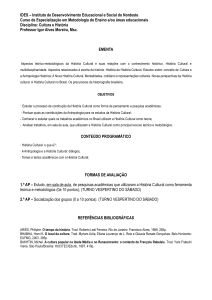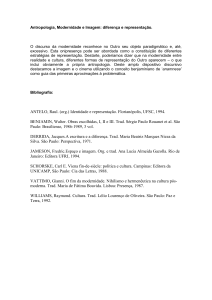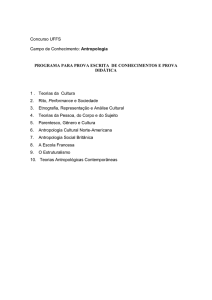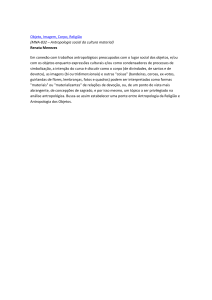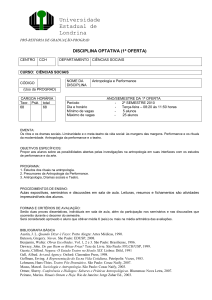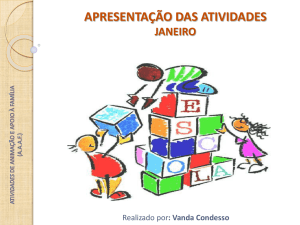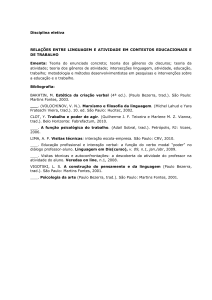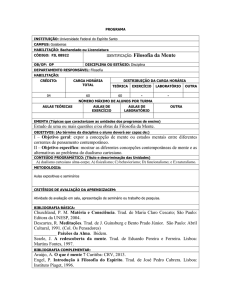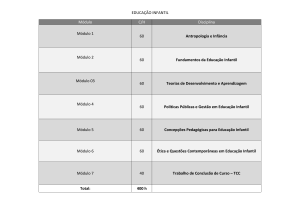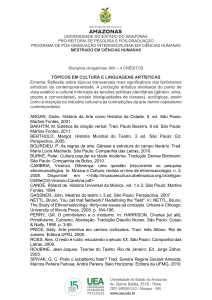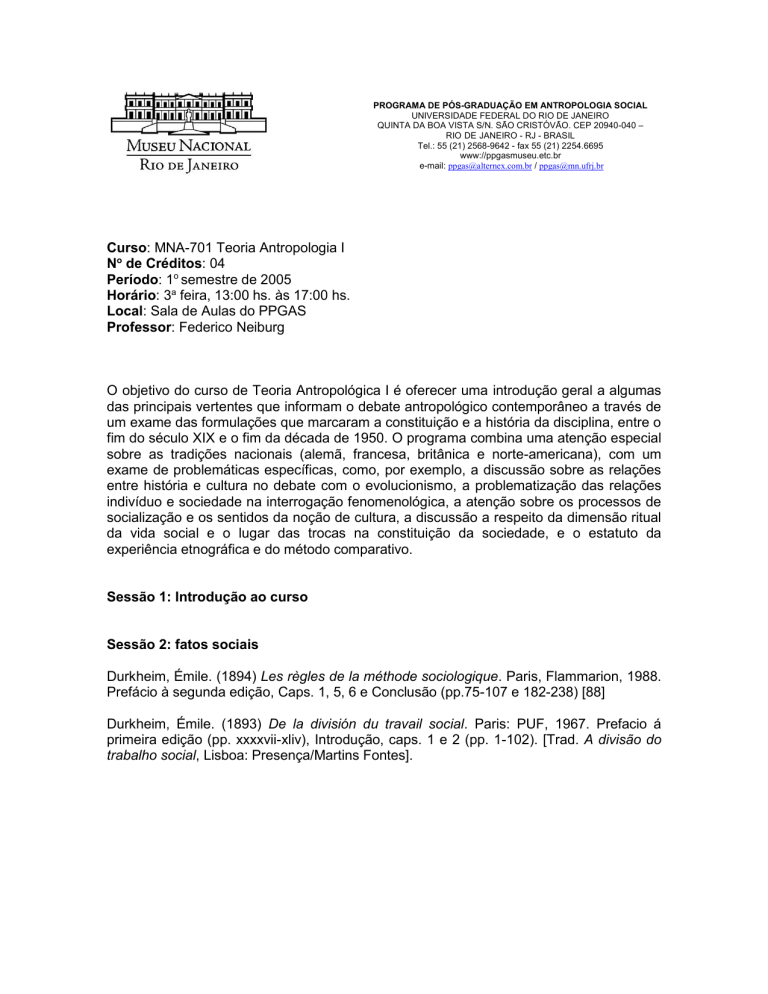
PROGRAMA DE PÓS-GRADUAÇÃO EM ANTROPOLOGIA SOCIAL
UNIVERSIDADE FEDERAL DO RIO DE JANEIRO
QUINTA DA BOA VISTA S/N. SÃO CRISTÓVÃO. CEP 20940-040 –
RIO DE JANEIRO - RJ - BRASIL
Tel.: 55 (21) 2568-9642 - fax 55 (21) 2254.6695
www://ppgasmuseu.etc.br
e-mail: [email protected] / [email protected]
Curso: MNA-701 Teoria Antropologia I
No de Créditos: 04
Período: 1o semestre de 2005
Horário: 3a feira, 13:00 hs. às 17:00 hs.
Local: Sala de Aulas do PPGAS
Professor: Federico Neiburg
O objetivo do curso de Teoria Antropológica I é oferecer uma introdução geral a algumas
das principais vertentes que informam o debate antropológico contemporâneo a través de
um exame das formulações que marcaram a constituição e a história da disciplina, entre o
fim do século XIX e o fim da década de 1950. O programa combina uma atenção especial
sobre as tradições nacionais (alemã, francesa, britânica e norte-americana), com um
exame de problemáticas específicas, como, por exemplo, a discussão sobre as relações
entre história e cultura no debate com o evolucionismo, a problematização das relações
indivíduo e sociedade na interrogação fenomenológica, a atenção sobre os processos de
socialização e os sentidos da noção de cultura, a discussão a respeito da dimensão ritual
da vida social e o lugar das trocas na constituição da sociedade, e o estatuto da
experiência etnográfica e do método comparativo.
Sessão 1: Introdução ao curso
Sessão 2: fatos sociais
Durkheim, Émile. (1894) Les règles de la méthode sociologique. Paris, Flammarion, 1988.
Prefácio à segunda edição, Caps. 1, 5, 6 e Conclusão (pp.75-107 e 182-238) [88]
Durkheim, Émile. (1893) De la división du travail social. Paris: PUF, 1967. Prefacio á
primeira edição (pp. xxxxvii-xliv), Introdução, caps. 1 e 2 (pp. 1-102). [Trad. A divisão do
trabalho social, Lisboa: Presença/Martins Fontes].
2
Sessão 3: sociabilidade
Simmel, Georg. (1909). “The problem of sociology.” The American Journal of Sociology
15(3): 289-320. [disponível em JSTOR]
Simmel, Georg. (1910). “How is society possible.” The American Journal of Sociology
16(3): 372-391. [disponível em JSTOR]
Simmel, Georg. (1949 [1910]). “The sociology of sociability.” The American Journal of
Sociology 55(3): 254-261. [disponível em JSTOR]
Simmel, Georg. (1906) “The sociology of secrecy and of secret societies.” The American
Journal of Sociology 11(4): 441-498. [disponível em JSTOR]
Sessão 4: ethos
Weber, Max. (1904-1905) L’éthique protestante et l’esprit du capitalisme, Paris,
Flammarion, 2001 (traduction Isabelle Kalinowski). Partie I, “Le problème”, pp. 69-152. [A
Ética protestante e o espírito do capitalismo, São Paulo, Companhia das Letras, 2004]
Weber, Max. (1906) “Les sectes protestantes et l’esprit du capitalisme”, in L’éthique
protestante et l’esprit du capitalisme, Paris, Flammarion 2001 (traduction Isabelle
Kalinowski), pp. 305-342. [trad. em Gerth, H. e Wright Mills, C. (orgs.). Max Weber
Ensaios de Sociologia. Rio de Janeiro: Zahar Editores, s/d: 347-70]
Weber, Max. (1910) “Réponse final aux critiques”, in M. Weber, Sociologie des religions,
Paris, Gallimard, 1996 (traduction Jean-Pierre Grossein). pp. 133-163.
Sessão 5: crença
Mauss, Marcel & Hubert, Henri. (1902-1903) “Esquisse d’une théorie générale de la
magie”. In: Mauss, M. Sociologie et Anthropologie. Paris: PUF, 1985, pp. 3-141. [Trad:
Sociologia e Antropologia, São Paulo: Cosac & Naify, 2003]
Sessão 6: trocas 1
Mauss, Marcel. (1923-1924) “Essai sur le don. Forme et raison de l’échange dans les
sociétés archaïques””. In: Mauss, M. Sociologie et Anthropologie. Paris: PUF, 1985, pp.
145-279. [Trad: Sociologia e Antropologia, São Paulo: Cosac & Naify, 2003]
Sessão 7: trocas 2
Malinowski, Bronislaw. (1922) Argonauts of the Western Pacific [Trad: Argonautas do
Pacífico Ocidental : São Paulo : Abril Cultural, 1976]. Capítulos a selecionar.
3
Sessão 8: obrigações
Malinowski, Bronislaw. (1926) Crime and Custom in Savage Society, 1926. [trad. Crime e
Castigo na Sociedade Selvagem, Brasília, UnB: 2003]
Sessão 9: cultura 1
Boas, Franz. (1887) “A year among the Eskimo”. In; Stocking Jr., G. The shaping of
American Anthropology 1883-1911: A Franz Boas Reader. New York: Free Press. [trad: A
formação da antropologia Americana 1883-1911, Rio de Janeiro, Contraponto / UFRJ,
2004, pp. 67-80]
Boas, Franz. (1888) “The aims of ethnology”. In: Race, Language and Culture: 243-259.
New York: The Free Press, 1966, pp. 626-638.
Boas, Franz. (1896) “The limitations of comparative method in anthropology” [trad. Boas,
F. Antropologia Cultural, Rio de Janeiro: Zahar, 2004, pp. 25-40]
Boas, Franz. (1920) “The methods of ethnology” [trad. Boas, F. Antropologia Cultural, Rio
de Janeiro: Zahar, 2004, pp. 41-52]
Boas, Franz. (1932) “The Aims of Anthropological Research”. In: Race, Language and
Culture: 243-259. New York: The Free Press, 1966. [trad. Boas, F. Antropologia Cultural,
Rio de Janeiro: Zahar, 2004, pp. 87-109)
Sessão 10: cultura 2
Kroeber, Alfred. (1952) “On Culture”, In: Parsons, T. et alii. (eds.) Theories of society.
Foundations of Modern Sociological Theory, New York: The Free Press, pp. 1032-1036.
Benedict, Ruth. (1932) Patterns of Culture. Boston: Houghton Mifflin. Caps. 1, 2, 3 e 7.
Sapir, Edward. (1924) “Culture, Genuine and Spurious". In: Selected Writings of Edward
Sapir in Language, Culture and Personality. David G. Mandelbaum, ed. Berkeley:
University of California Press 1985, pp. 308-331. [trad: “Cultura autêntica e espúria”, In
Pierson, D. (org). Estudos de organização sociaI. São Paulo: Martins, 1970. pp. 282-311]
Sapir, Edward. (1934) “The Emergence of the Concept of Personality in a Study of
Cultures”. In: Selected Writings of Edward Sapir in Language, Culture and Personality.
David G. Mandelbaum, ed. Berkeley: University of California Press, 1985, pp. 590-597.
Mead, Margaret. (1953) "National Character". In: Tax, Sol (ed.) Anthropology Today.
Selections. Chicago: Chicago University Press, 1962, pp. 396-421.
Sessão 11: estrutura 1
Radcliffe-Brown, A. R. (1941) “The Study of Kinship Systems”. In The Journal of the Royal
Anthropological Institute of Great Britain and Ireland, 71 (1/2), pp. 1-18. [disponível em
4
JSTOR] [trad. Estrutura e função na sociedade primitiva. Rio de Janeiro, Vozes, cap 3, pp.
67-114]
Radcliffe-Brown, A. R. (1940) "On Joking Relationships". In: Africa. 1940, 13 (3), pp. 195210 [trad. Estrutura e função na sociedade primitiva. Rio de Janeiro, Vozes, cap 4, pp
115-132]
Evans-Pritchard, E. E. (1940) “The Nuer of Southern Sudan”. In: Fortes, M. & EvansPritchard, E. E. African political Systems, Oxford University Press, pp. 272-296.
Fortes, Meyer. (1949) "Time and Social Structure: An Ashanti Case Study". In Time and
Social Structure and Other Essays, University of London, The Athlone Press, 1970, pp. 131.
Fortes, Meyer. (1953) "The Structure of Unilineal Descent Groups". In: Time and Social
Structure and Other Essays, University of London, The Athlone Press, 1970, pp. 67-95.
Sessão 12: estrutura 2
Lévi-Strauss, Claude. (1947) “A Análise estrutural em lingüística e em antropologia”. In:
Antropologia estrutural. Rio de Janeiro: Tempo Brasileiro, pp. 45-70.
Lévi-Strauss, Claude. (1952) “A noção de estrutura em antropologia”. In: Antropologia
estrutural. Rio de Janeiro: Tempo Brasileiro, pp. 299-344.
Lévi-Strauss, Claude. (1955) “A estrutura dos mitos”. In Antropologia estrutural. Rio de
Janeiro: Tempo Brasileiro, pp. 225-253.
Lévi-Strauss, Claude. (1949) Les estructures élémentaires de la parente. Paris: Mouton,
1967 [trad. As estruturas elementares do parentesco, Petrópolis: Vozes, Caps 1 a 5 e 29]
Sessão 13: dinâmica 1
Gluckman, Max. (1940) “Analysis of a Social Situation in Modern Zululand”, The Rhodes
Livingstone Papers, No. 28. [trad. "Análise de uma situação social na Zululandia
moderna", in B. Fieldman-Bianco (org.) Antropologia das sociedades complexas, São
Paulo, Rio de Janeiro, Global, 1987, pp. 227-305]
Gluckman, Max. (1953) "Rituals of Rebellion in South-East Africa", in: Gluckman, M.,
Order and Rebellion in Tribal Africa, New York, The Free Press of Glencoe, 1963, pp.110136.
Mitchell, Clyde. (1956) Kalela Dance. Aspects of Social Relationships among Urban
Africans in Northern Rhodesia . The Rhodes-Livingstone Papers, No. 22. pp. 1-56.
5
Sessão 14: dinâmica 2
Bateson, Gregory. (1935) “Culture Contact and Schismogenesis”. The Journal of the Royal
Anthropological Institute of Great Britain and Ireland, Vol. 35. [disponível em JSTOR]
(reimpresso em: Steps to an Ecology of Mind: Collected Essays in Anthropology,
Psychiatry, Evolution, and Epistemology. Chicago: The University of Chicago press, 1999,
pp. 61-72).
Redfield, Robert. (1955) “The Little Community”. In: Redfield, R. The Little Community and
Peasant Society and Culture. Chicago. The University of Chicago Press, 1965. Caps. I
(pp. 1-16), III (pp 32-51), V (pp. 66-80), VII-VIII (pp. 96-131) e X (pp. 149-168).
Geertz, Clifford. (1954) “Form and variation in Balinese village structure”. In: Potter, J. et.
alii. (eds) Peasant society. A Reader. Boston: Little Brown Co., 1967, pp. 255-278.
Wolf, Eric. (1956) “Aspects of group relations in a complex society: México”. American
Anthropologists, Vol. 58, pp. 1065-1078. [trad. Antropologia do Poder. Contribuições de
Eric R. Wolf (Feldman-Bianco, B. e Lins Ribeiro, G. orgs), São Paulo/Brasília: EduB/Ed.
Unicamp, pp 73-91]
Sessão 15: dinâmica 3
Leach, Edmund R. (1954) Political Systems of Highland Burma. A Study of Kachin Social
Structure. London: Athlone Press, 1970. [trad. Sistemas Políticos da Alta Birmânia, São
Paulo: EDUSP, 1999]
A bibliografia complementar será distribuída na primeira aula do curso

